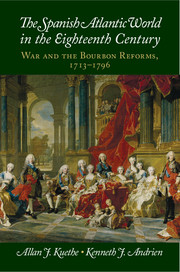Book contents
- Frontmatter
- Contents
- Introduction: War and Reform in Spain and Its Atlantic Empire
- I Alberoni, Patiño, and the Beginnings of Atlantic Reform, 1713–1736
- 1 Alberoni and the First Stirrings of Reform, 1713–1721
- 2 Alberoni and Colonial Innovation
- 3 José Patiño and the Revival of Reform, 1726–1736
- II The Second Wave of Reform, 1736–1763
- III Pinnacle of the Bourbon Reforms, 1763–1796
- Timeline for the Spanish Atlantic World in the Eighteenth Century
- Bibliography
- Index
- Plate section
- References
2 - Alberoni and Colonial Innovation
Published online by Cambridge University Press: 05 June 2014
- Frontmatter
- Contents
- Introduction: War and Reform in Spain and Its Atlantic Empire
- I Alberoni, Patiño, and the Beginnings of Atlantic Reform, 1713–1736
- 1 Alberoni and the First Stirrings of Reform, 1713–1721
- 2 Alberoni and Colonial Innovation
- 3 José Patiño and the Revival of Reform, 1726–1736
- II The Second Wave of Reform, 1736–1763
- III Pinnacle of the Bourbon Reforms, 1763–1796
- Timeline for the Spanish Atlantic World in the Eighteenth Century
- Bibliography
- Index
- Plate section
- References
Summary
While Alberoni’s ambitious attempts to regain control over Spain’s ports contributed to the outbreak of the disastrous War of the Quadruple Alliance (1718–1720), he also promoted other serious reforms within the Spanish Atlantic world. The Italian knew that Spain controlled an Atlantic empire, and any attempts to renovate the metropolis and restore Spanish prestige and power in Europe must rely on tax revenues and trade from the Indies. Interest groups in Spain and the Americas, however, stood ready to oppose changes that might undermine their own partisan interests. The wealth of the Indies also drew the attention of Spain’s rivals, who wanted unrestricted access to American markets, and they were even prepared to go to war to control the wealth of the Spanish Indies. A serious reform of Spain’s transatlantic trade would have consequences felt throughout the Atlantic world. Fraud, unregistered cargoes, and corrupt local officials in the Indies had always plagued Spain’s transatlantic trade to some degree, but in the years following the War of Succession, contraband trade controlled by English, French, and Dutch traders escalated to alarming levels. This illicit commerce led to disappointing commercial profits for Spanish and colonial merchants and to diminished tax returns on trade fairs in Veracruz and Portobelo. Moreover, from their foreign bases in the Caribbean, Spain’s enemies preyed on the Flotas and Galeones returning to Spain. Within this context, the concessions at Utrecht to the British – Europe’s emerging commercial leader in the early eighteenth century – were potentially even more damaging. In short, widespread contraband in the Pacific and the Caribbean threatened the very commercial lifeline of the monarchy. It is no small wonder that the ambitious Alberoni made reform on both sides of the Atlantic a major priority.
- Type
- Chapter
- Information
- The Spanish Atlantic World in the Eighteenth CenturyWar and the Bourbon Reforms, 1713–1796, pp. 68 - 97Publisher: Cambridge University PressPrint publication year: 2014

